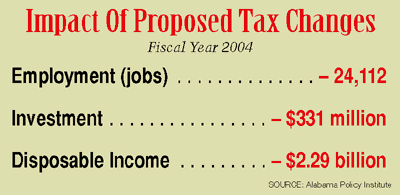Study Shows Tax Plan Would Cost Jobs

Gov. Bob Riley’s $1.3 billion tax package would cost Alabama more than 24,000 jobs and reduce Alabamians’ disposable incomes by $2.3 billion next year, according to a study commissioned by the Alabama Policy Institute.Among the changes included in the governor’s package are raising property taxes by more than $400 million a year; raising taxes on banks; raising sales taxes on cars, pickup trucks and farm equipment; raising cigarette taxes; and charging sales tax on automobile and appliance repair work. Another major change included in the package is a provision to eliminate the state income tax deductions for federal income taxes, and Social Security and Medicare. Combined with the higher income tax rates included in the governor’s tax increase package, removing those deductions would boost state individual income tax collections by another $421 million a year.The study, conducted by the Beacon Hill Institute at Suffolk University, points out that these tax increases could have a negative impact on the state’s economy. “In considering these changes to the tax code, it is important to assess the economic benefits and costs involved,” the study said. “Tax changes affect the behavior of households and firms–individuals may work more or less, and businesses may increase or decrease investment. In this report, we trace the effects of instituting these changes to the state tax code for fiscal years 2004 through 2008.”By instituting these numerous and varied tax changes the governor believes he can raise enough revenue to more than cover the current budget deficit while making the tax code more equitable. However there are economic consequences associated with these changes that should also be considered,” the study added.According to the study, some of the proposed tax changes would result in minimal employment gains in Alabama, while others show large job losses and all lead to decreases in investment and disposable income.In fiscal year 2004, the study shows that Alabama employment would shrink by over 24,000 jobs or 1.18 percent of current employment. Investment and disposable income would also decrease by $331 million and $2.3 billion, respectively.The only income group that would see a rise in their disposable income is those families earning between $10,000 and $19,999–only 17 percent of households. The other 83 percent of Alabama households would be worse off because of these tax changes.By 2008, the study says Riley’s tax plan would cost Alabama more than 28,000 jobs a year.”Based on these projections, it appears that while the combined tax changes in the current package should lead to an increase in state tax revenue…, they will also serve to further slow the Alabama economy and delay the state’s economic recovery,” according to the study. “During this weak economy, it would seem prudent for state leaders to consider alternative means of raising revenue that would have a less negative impact on the Alabama economy,” the study said.EDITOR’S NOTE: The Alabama Policy Institute study was conducted prior to the adjournment of the Alabama Legislature’s Special Session and, therefore, did not take into account changes to the tax bills made during the legislative process.
